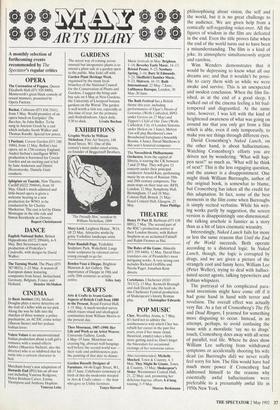Cinema
Until the End of the World ('15', Lumiere) Naked Lunch ('18', selected cinemas)
A good snooze
Vanessa Letts
Wim Wenders's Until the End of the World is the kind of film you drift along with in an uncritical state of mind. The crit- ics, not surprisingly, couldn't stand it. If you go to it steeled for pretension, you're liable to miss the point. The film is funny, and the story has all the logic ŌĆö or illogic ŌĆö of a dream. It never aspires to anything more concrete. All complaints of implausi- bility within the film itself soon fade away and are made to seem petty and irrelevant. If it gets you in its grip, watching Until the End of the World is as pleasant and refresh- ing as a good snooze.
As dreams go, this isn't a bad one. It starts, in a practical and liberating way, with a car crash that leads some bank rob- bers to ask the heroine, Solveig Dom- martin, to take care of their haul. At once we are in a world where unreasonable things can happen and yet be paid for. Although it is set only seven years from now, in 1999, the story concerns a fantastic machine which can take photographs for the blind and produce pictures of dreams. This does lead eventually to some philosophising about vision, the self and the world, but it is no great challenge to the audience. We are given help from a comically self-regarding voice-over. All the figures of wisdom in the film are defeated in the end. Even the title proves false when the end of the world turns out to have been a misunderstanding. The film is a kind of joke, its atmosphere simultaneously urgent and careless.
Wim Wenders demonstrates that it would be depressing to know what all our dreams are; and that it wouldn't be possi- ble to carry them with us while we were awake and survive. This is an unexpected and modest conclusion. When the film fin- ished, as at the end of a good sleep, I walked out of the cinema feeling a bit bad- tempered and disgruntled. At the same time, however, I was left with the kind of heightened awareness of what was going on around me that you only get from a film which is able, even if only temporarily, to make you see things through different eyes.
David Cronenberg's Naked Lunch, on the other hand, is about hallucinations. Watching Cronenberg's efforts you are driven not by wondering, 'What will hap- pen next?' so much as, 'What will he think of next?' This is the less engaging question, and the answer is a disappointment. One might think William Burroughs, author of the original book, is somewhat to blame, but Cronenberg has taken all the credit for this adaptation. In fact, some of the best moments in the film come when Burroughs is simply recited verbatim. While his writ- ing works partly by suggestion, the screen version is disappointingly one-dimensional: the talking arsehole is funnier as a story than as a bit of latex cinematic wizardry.
Interestingly, Naked Lunch fails for more or less the same reasons that Until the End of the World succeeds. Both operate according to a distorted logic. In Naked Lunch, though, the logic is corrupted by drugs, and we are given a picture of the strangely cool and funny hero, William Lee (Peter Weller), trying to deal with halluci- nated secret agents, talking typewriters and lesbian whipsters.
The portrayal of his complicated para- noid inventions might have come off if it had gone hand in hand with terror and revulsion. The overall effect was actually very flat. As a fan of Cronenberg's The Fly and Dead Ringers, I yearned for something more disgusting to occur. Instead, in an attempt, perhaps, to avoid confusing the issue with a moralistic 'say no to drugs' touch, Cronenberg does away with all sense of parallel, real life. Where he does show William Lee suffering from withdrawal symptoms or accidentally shooting his wife dead (as Burroughs did) we never really feel sorry for him. The film would have had much more power if Cronenberg had addressed himself to the reasons why essentially awful hallucinations were preferable to a presumably awful life in 1950s New York.



















































 Previous page
Previous page